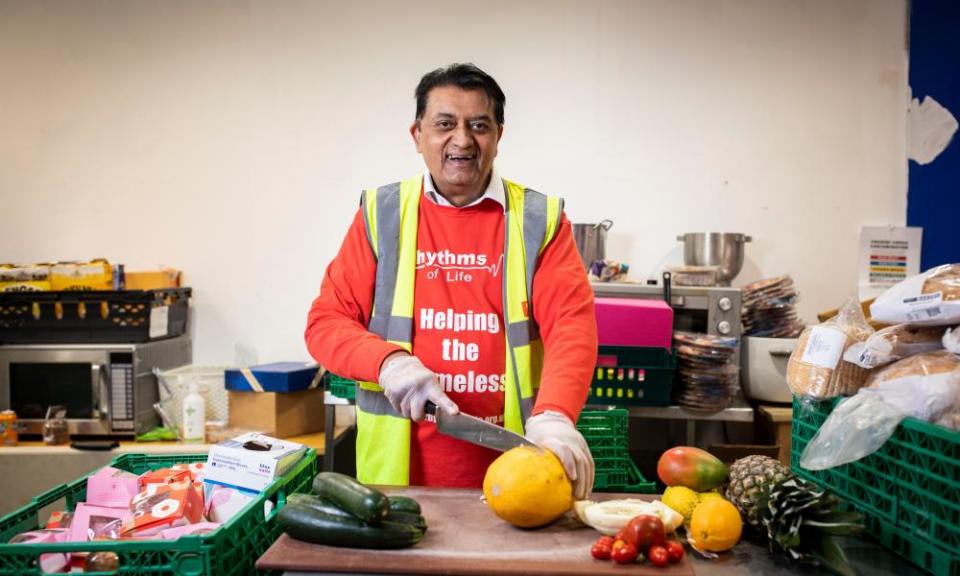The homeless charity organiser with an insider’s perspective

“I have been doing this for 14 years,” Andrew Faris half yells down the phone over the rush of noise behind him. Volunteers at his charity are preparing dinners for homeless people – veggie curry and chicken wings. “People ask me: do you ever take a day off? But there’s still so much to be done.” Faris, who tells me he is in his late 40s, runs a small, London-based charity called Rhythms of Life. The former photographer takes no salary and has put his life savings, about £70,000, into it. (The charity also receives donations.)
For Faris, this work is personal. He was homeless for six years in the 1990s. He had run a successful commercial lettings business, but overleveraged himself and went broke. His first night sleeping rough was terrible, he says. He sat and thought, “No, I won’t do silly things. I will get through this.”
There is so much to think about when sleeping rough. Where will you shower? Where will you wash your clothes? How will you find something to eat? Faris didn’t even have a sleeping bag. He asked other homeless people and they sent him to a nearby shelter.
“Every day, you repeat the whole episode,” he says. “Get up and go to a shelter. Get your clothes washed and have a shower. Have some cheap coffee and powdered milk and bread that has gone off.”
Being nobody is the worst thing. Nobody says hello. That’s what I missed the most
Andrew Faris
Most homeless people have a spot they favour. Faris’s was behind the Savoy Hotel, where there were some bushes he would conceal himself in. It’s best to make yourself inconspicuous. The general public can be cruel, especially people who are drunk.
“Stag parties would tie your shoelaces, pour lighter fluid on your shoes and set them alight,” says Faris. “You’d wake up with your feet tied together and burning at the same time.” A woman once urinated on him. “It was a dare,” he explains, “among a group of girls. I woke up in disgust and felt bad for myself that this had happened.”
But abusive drunks weren’t the worst thing about being homeless. “Being nobody is the worst thing,” he says. “Nobody says hello. That’s what I missed the most. I wasn’t acknowledged as a human being.”
Eventually he found work selling The Big Issue, and then on a market stall. He saved enough money to buy a camera and become a photographer. Six years later, by the 2000s, he was no longer homeless and his career was thriving. But he kept thinking about the people he’d left behind on the streets.
In day centres for the homeless, he says, the vibe is usually negative – food bad, staff uninterested. Faris realised that he knew more than most about what homeless people really needed, and so set up Rhythms of Life in 2008. He and his team of 40 volunteers distribute food to homeless people four days a week; two days a week, he goes to domestic abuse shelters. It’s not uncommon for queues of up to 150 people to form in Trafalgar Square for his food.
“We do it with passion,” he says. “We know their names. We make sure they have tea and cake in the queue while they wait.” Faris collects leftover food from supermarkets most evenings, and spends the following day preparing meals.
“Andrew is the most selfless, dedicated man I have ever met,” says volunteer Frazier Stroud. “He has delivered food, support, employment opportunities and care to homeless people across London and, to my knowledge, has never taken a day off.”
Faris’s team also try to empower people to get off the streets. “We do 10-week courses,” he says, “where we teach IT, English and life skills like how to open a bank account or try to reduce your drug and alcohol consumption.” Sometimes homeless people are offered volunteer positions with the charity – if they perform reliably, Faris will give them a reference and vouch for them to future employers.
Faris is an incorrigible workaholic. When I try to ask him about his treat, calls go unanswered and texts unread. Eventually, after months of being pestered, he suggests one thing that would improve his life: an iPad to use when making presentations about Rhythms of Life to potential donors. His laptop is battered and slow. He has a big funding meeting coming up which will determine whether he’s able to hire a bus to take a group sightseeing around London, and for a special meal. AO.com provides Faris with a new, top-of-the-range iPad just in time for his big meeting. He uses it to show executives photographs of people queueing for meals, and statistics about how many people they’ve served. “They were impressed,” he says. He plans to use the iPad to collect data about clients’ needs in real time, from shoe sizes to training needs.
And with that, a streamlined, more efficient Faris bids me goodbye: he has more mouths to feed, and places to be. “It’s all good,” he concludes, no doubt already thinking about preparing the next dinner.
Want to nominate someone for Guardian angel? Email us – with their permission – and suggest a treat at guardian.angel@theguardian.com

 Yahoo Sports
Yahoo Sports 